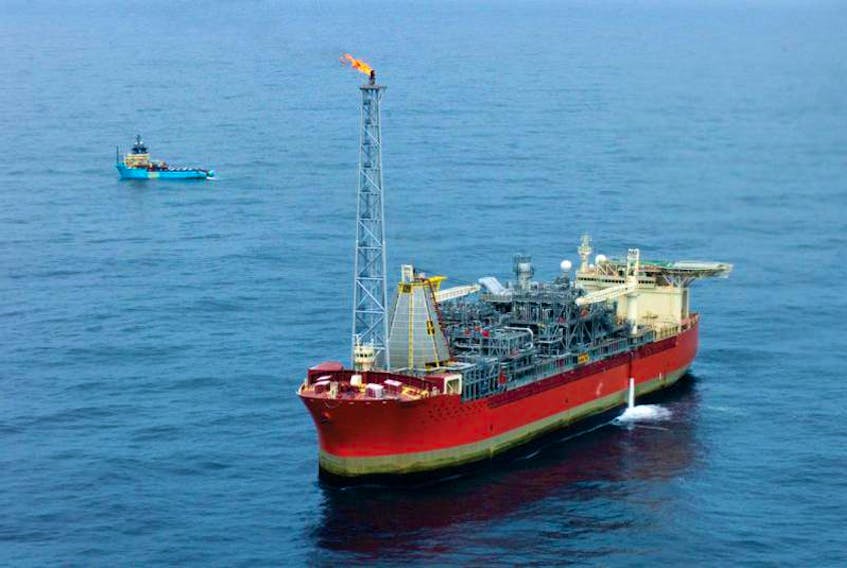In the 36 hours since an order was issued to cease all of Husky Energy’s petroleum-related operations aboard the SeaRose FPSO, CNLOPB chair and chief executive officer Scott Tessier says the board is “fairly encouraged” by the company’s response.
“It’s still a work in progress, but they’re saying all the right things so far,” Tessier told The Telegram on Friday ahead of another meeting between the company and the board’s senior leadership teams.
“I don’t want to pre-judge what the outcome of that is going to be, but I suspect today won’t be the last on this matter.”
Related story:
Iceberg has near-miss with Sea Rose FPSO off Newfoundland
The Canada-Newfoundland and Labrador Offshore Petroleum Board issued the order in relation to the company’s non-compliance to its ice management plan (IMP) when an iceberg entered the floating production, storage and offloading (FPSO) vessel’s quarter-nautical-mile ice exclusion area in late March 2017.
Rather than disconnecting, as per its IMP, Husky officials prepared to do so, but ultimately left the ship in place, with the 84 personnel on board instructed to muster and “brace for impact.”
The day after the incident, the CNLOPB issued a notice of noncompliance and an order to comply to Husky.
The iceberg, described in a CNLOPB incident report as 40 metres wide, 60 metres long and standing eight metres above the waterline, passed within 180 metres of the SeaRose. There were no injuries and no damages to the facility or the environment.
“They followed their plan to a tee right up until the critical decision to disconnect,” Tessier says.
Asked why it took nearly 10 months for the CNLOPB to issue the cessation order, Tessier says the preliminary enquiry undertaken by the board after it was unsatisfied with Husky’s own investigation and subsequent report into the incident is a time-consuming endeavor that couldn’t be rushed.
Moreover, Tessier says it’s important to emphasize that the investigations by “world-class, highly trained offshore safety and environmental protection professionals” and not the by board guide the CNLOPB’s decisions.
“While our investigators proceed independently, and there’s a bit of a wall around them at that point, they’re empowered to flag any immediate operational safety or environmental issues or concerns that arise during the conduct of an enquiry,” he said, noting that no such concerns were identified, so there was no need immediate need to escalate the matter to the board’s chief safety officer (CSO) or chief conservation officer (CCO).
“If we had taken additional enforcement action in the absence of a completed enquiry, there’d be a lot of commentary about us acting capriciously or arbitrarily, and that’s not what people want to see from a regulator, either.”
As for what Husky needs to do in order to restore the board’s confidence, Tessier says they’re “trying not to be too prescriptive” regarding corrective actions or how long the suspension will be.
“The ball is in their court in terms of what their plans are and what kind of measures they’re going to put in place, and then we’re going to have to take a little bit of time to assess that and make sure the CSO and CCO are truly confident that Husky is OK to resume.”
Husky did not make any of its senior leadership available for an interview, but in a pair of emailed responses to questions posed by the Telegram, media and issues manager Mel Duval says the company is “focused right now on putting a plan and procedures in place that will satisfy the regulator.”
Duval says the company doesn’t expect any impact on staff and that the vessel will remain connected on site throughout the suspension, during which time they hope to carry out some maintenance.
Other questions posed to Duval included whether there would be any reprimands or punishment for onshore senior management or the offshore installation manager; whether there have been other incidents where Husky did not follow agreed-upon operations plans; and whether there were cost implications to disconnecting and reconnecting.
“We do not discuss personnel issues,” Duval wrote. “In terms of your remaining questions, we’ve been pretty clear: We could have and should have responded differently, and in accordance with the pre-existing plan.”
The suspension means that the 38,000 gross daily barrels of crude produced by the fields tied to the SeaRose — 27,000 of which are Husky’s, representing close to eight per cent of its total oil and gas production — won’t come aboard.
Royalties to the province, reportedly in the area of $200,000 per day, will be on hold until production resumes.
The suspension is also affecting Husky’s share price, with stock down $1.29, or 6.77 per cent, to $17.77 at the closing of markets on Thursday, after dropping as low as $17.58 earlier in the day from Wednesday’s close of $19.06. As 1:30 p.m. EST on Friday, it was sitting at $17.68.
Unifor weighs in
Unifor, which represents 700 workers aboard the Hibernia platform and the Terra Nova FPSO, says the shutdown order sends a strong message, and the union commended the CNLOPB for its actions.
“It is simply not acceptable to put 84 workers’ lives at risk on a floating platform, bracing for an iceberg less than 500 metres away,” Unifor Atlantic regional director Lana Payne stated in a news release.
“Unifor has been a vocal and strong advocate of proactive worker safety, and nowhere more so than the offshore oil industry. History shows when we stop being vigilant for one second the consequences are tragic, with workers losing their lives.”
— With files from the Canadian Press
Twitter: kennoliver79









